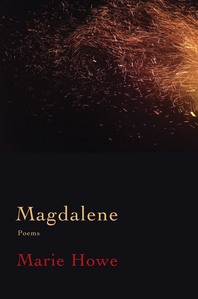Magdalene
by Marie Howe
reviewed by Florian Gargaillo
Marie Howe’s new book, Magdalene, offers a sequence of lyrics spoken by the figure of her title, but who is Magdalene? In one poem, she claims a whole list of identities across time: the witch hung by her neighbors, the girl in the asylum, the housewife, the businesswoman, the teacher. Other poems imagine scenes taking place at the edge of canonical religious narratives—the small acts that might have occurred just a few streets, or even a few feet, away from the main events. For the most part, though, the Magdalene of this book is thoroughly modern and middle class: She takes pills, feels overwhelmed by her demanding schedule (“I had no time. How had this happened? / How had our lives gotten like this?” (“Magdalene—The Seven Devils”)), and scolds her lover for not paying attention or cleaning up after himself.
In fact, Howe is not really concerned here with religion or spirituality. Her true theme is desire, its paralyzing hold and its disappointments. The biblical Magdalene is of interest to her as a woman who devoted herself to an impossible union, so that desire in this book is almost always depicted as a trial: “I was driven toward desire by desire. / believing that the fulfillment of that desire was an end. / There was no end” (“How the Story Started”). Desire, for Howe, also breeds alienation from one’s own body and from those one holds dearest. The poem “Fourteen” marks a turning point in the relationship between a mother and daughter:
She is still mine—for another year or so,
but she’s already looking past me
through the funeral-home doorto where the boys have gathered in their dark suits.
In poem after poem, Magdalene tries to overcome estrangement. These efforts can take the form of visions in which she sees through the material world to something fundamental. But such insights rarely go beyond the imaginary, as in “Magdalene Afterwards”: “I want to see through the red bricks of the building across the street, / into the something else that almost gleams through the day.” At other times, she takes refuge in the earthlier comforts of physical contact:
I rested my chin on his shoulder looking toward the shore.
As he must have been looking over my shoulder, to where the water deepened and
the
small boats tugged on their anchors.
(“Low Tide, Late August”)
The couple embraces in the water, but the embrace forces them to look in opposite directions, so that the speaker can only guess what her lover saw in the water. The last two lines—a single moored article before the rest of the clause is completed in one breath—softly tug on the first half of the sentence as her imagination is drawn away from their union toward the sea. The final image captures the strain experienced by the couple, between tide and anchor, the pull of separation and the grounding of their union, imperfect as it may be.
Less successful are the book’s allusions to unnamed traumas. These poems have a tendency to luxuriate in suffering: “I liked to go there alone / relieved to lie in the wreckage, ruined, physically undone” (“Magdalene: The Addict”). It is difficult to square such excesses against the posture of restraint that remains the book’s preferred poetic mode. Magdalene’s languor can seem indulgent, a display of agony that cannot elicit much sympathy because it feels so manufactured. Such traits will be familiar to readers of contemporary verse in the “confessional” mode, and indeed many of the book’s weakest moments occur when it falls too readily into the expected patterns of that style.
Howe’s philosophical inquiries work best in poems like “Conversation: Dualism”:
Is that bad? the girl says, when someone tells a story, or when we see
an accident on the road, or lately when almost anything happens.Well, I say, not good, nor bad.
But is it bad? she says again, sensing my smallhesitation. Well,
not good, I say—and that seals it.
But it doesn’t, of course, and Howe’s point is precisely that it doesn’t. The girl’s query, which pushes the poet to choose between absolutes of right and wrong, is naive and yet not easy to dismiss. The poet’s response, for all its apparent moderation, is meant to be unsatisfactory. Here we find a question, simple but not simplistic, that really does haunt Howe’s imagination, one she takes up throughout her book.
Published on April 11, 2017

